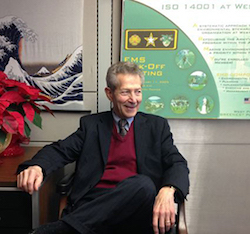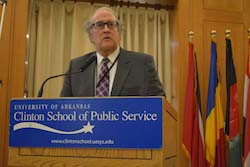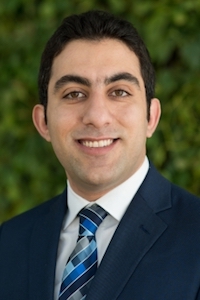Our Environmental and Energy Management Institute (EEMI) has seen a tremendous amount of action on the research front during the latter half of 2018, which can be seen from the following project summaries.
Since the last issue of this newsletter, the U.S., Department of Defense provided EEMI with a $168,250 award for a one-year extension of our Chemical and Material Risk Management project. EEMI Senior Research Scientist Dr. Kelly Scanlon serves as the Principal Investigator for that project.
 |
EEMI Assistant Professor Ekundayo Shittu |
In July, EEM Assistant Professor Dr. Ekundayo Shittu received a $499,991 grant from the National Science Foundation as the Principal Investigator on a four-year project involving the quantification of complex adaptive food-energy-water system using a coupled agent-based modeling framework. Dr. Shittu is working with his collaborators at the University of Houston, Lehigh University and the Tsinghua University in China to develop a new mathematical modeling framework to decipher such complex, adaptive systems. The proposed modeling framework centers on an agent-based representation of the linkages among food, energy, and water sub-systems and between human and physical systems across multiple temporal and spatial scales. The teams will test the utility of the new modeling framework over the Columbia River and Mekong River system in the U.S. and China, respectively, hopefully generating new understanding that will be transferable to other river basins.
In August, Dr. Ekundayo Shittu was awarded a one-year, $30,084 Duke Energy Renewables grant for his project “Evaluating the Ecosystem of Microgrids in the Arctic and Developing Countries.” The project will contribute to “Lighting Africa,” a joint initiative of the World Bank and the International Finance Corporation, by exploring a variety of adaptive technology choices that are specific to the arctic and developing countries in tandem with the local absorptive institutional capacities. Approximately 1.2 billion people worldwide lack access to electricity; and more than half of the world’s total un-electrified population live in Sub-Saharan Africa.
   |
EEMI Research Professor Joe Cascio, Research Associate Ryan Gabel, Research Professor Alex Beehler |
Also in August, EEMI Research Professor Alex Beehler received a $43,000 grant from the ClearPath Foundation to investigate the future use of very small modular nuclear reactors (2-10 MWe) as a source of safe and clean energy for military installations and operations. EEMI Research Professor Joe Cascio is a co-Principal Investigator on the project and doctoral student Ryan Gabel is the project’s Research Associate. Growing attention within the military is being drawn to the fact that up to half of American casualties in forward-deployed scenarios occur due to supply chain operations, much of which are focused on supplying fuel oil for operations. Nuclear energy could greatly reduce U.S. casualties by minimizing the need for diesel fueled electricity in secure military operations and to provide energy security in the event of civil power grid outages that could be caused by a systematic attack on our grid, cyber or otherwise.
In September, EEMI Director of Renewable Energy Professor Scott Sklar submitted a proposal to the Virginia Department of Mines, Minerals and Energy and the Virginia Solar Energy Development and Energy Storage Authority for a $100,000 study to help accelerate energy storage development and deployment in Virginia
Also in September, Dr. Ekundayo Shittu recently received a $50,000 National Science Foundation team grant for the project “Developing a National Market for Renewable Energy Certificates.” Dr. Shittu is the principal investigator on the grant, and his team includes his graduate student Janiele Custodio, who is serving as the entrepreneurial lead.
In November, EEM Assistant Professor John Helveston and School of Business Assistant Professor Anna Helm submitted a $40,000 proposal to Duke Energy Renewables for a project entitled “Spatial and Temporal Mapping of Technological Progress in Electric Vehicle Powertrain Technologies.” If funded, this project will analyze global EV data from the past decade to identify spatial and temporal trends in performance improvement of core EV technologies. Technological improvements in core components, such as batteries, motors, and control systems, are being made in different markets around the world, yet few researchers have mapped this progress over space and time. Given the path-dependent nature of technological evolution, understanding where key technological progress is being made may be as important as understanding what progress is being made in order to accurately project the rate, locus, and direction of future powertrain innovations in the global automotive industry.
 |
Assistant Professor Payman Dehghanian |
In December, a team including Principal Investigator Jonathan Deason (EEM Lead Professor), Assistant Professor Payman Dehghanian of the Department of Electrical and Computer Engineering (co-Principal Investigator) and others submitted a $6,147,683 proposal entitled “Advanced Systems Integration for Solar Technologies: Solar Situational Awareness and Resilient Solutions for Critical Infrastructure” to the Energy Efficiency and Renewable Energy program of the U.S. Department of Energy. The project, if funded, will develop methods to and ensure faster-than-real-time online solar situational awareness to enhance cyber security for the solar industry. To this end, the proposed approach will address several interrelated challenges in securing a cyber-resilient integration and utilization of solar energy for daily load balancing and provide grid support during emergencies. External partners in this proposal include the University of Pittsburgh, Argonne National Laboratory, Duke Energy Renewables, AECOM and the Stella Group.






